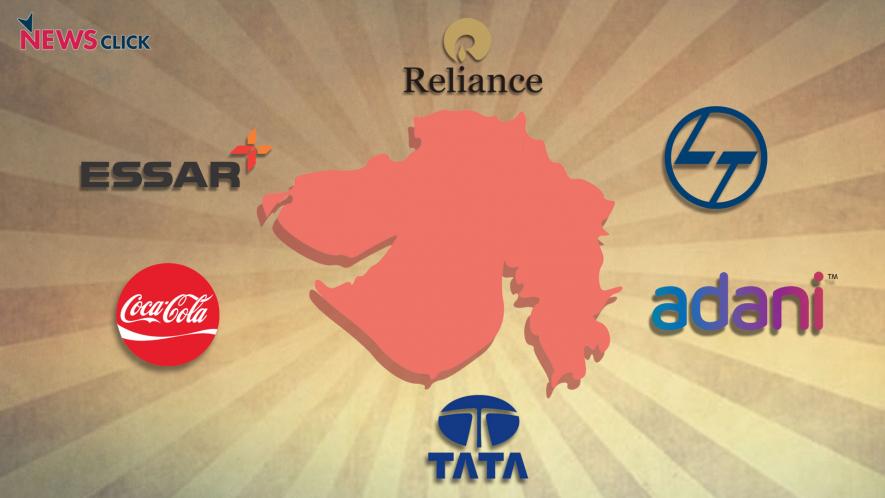Gujarat’s BJP Govt. Snatches Farmers’ Land To Give To Corporates

Dispossession of land from poorer people and farmers and its ‘sale’ at throwaway prices to corporate houses has been a defining feature of 19 years of uninterrupted rule by the BJP in Gujarat. This can be said to be a characteristic of the so called Gujarat ‘model of governance and development’. Such is the pro-corporate bias of this ‘model’ regime that it shows extreme reluctance to give land pattas (rights) to poor tribals even though there is a central law enacted for the purpose. On the other side, it throws all regulations out of the window to distribute largesse to rich corporate houses, as documented by media and CAG reports.
As a result, the BJP state government has been the target of a number of resistance movements of common people of Gujarat. Many of these are centered around acquisition of land or non-allocation of land. This has also contributed to agrarian unrest in the state which is being expressed in recent years through numerous protests and agitations across Gujarat by the Patidar community, Other Backward Classes (OBC), dalits and tribals.
Over the years, Gujarat has shown very poor record in the implementation of the Forest Rights Act (FRA), 2006. According to the Act, the state governments are bound to verify and distribute land titles to farmers among the scheduled tribes and other traditional dwellers who have claimed rights over forest land. By July 2017, only 44% of land titles have been distributed out of all the claims received by Gujarat government. In the implementation of this essential initiative, Gujarat stands way behind many other tribal population states. Status of implementation of FRA in terms of disposal of land right claims in some other states is as follows - Tripura (63%), Kerala (65%), Odisha (65.7%), Rajasthan (50.8%), Telangana (50.5%) and Andhra Pradesh (50%).
Tribals argue that there have been various obstacles put up at different stages by the forest department officials and state police in the implementation of the act. The Scheduled Tribes constitute about 14.8% of the state population, and more than 35% of them are below poverty line, as of 2011-12.
While the total agricultural land available for cultivation in the state is about 12661 thousand hectares, as per Agricultural Census 2010-11, the number of marginal (less than one hectare of land) and small (between 1 and 2 hectares of land) holdings in the state constitute about 66 % of total number of land holdings as against large size holdings (more than 10 hectares of land) which constitute only 1% of the total number of land holding. Between 2000-2001 and 2010-2011, the average size of marginal land holdings has fallen from 0.53 hectare to 0.49 hectare indicating the conditions of these farmers in the state. These small and marginal farmers are very vulnerable sections and acquisition of land leaves them pauperized.
Gujarat also witnessed a massive fall in the number of cultivators which is 3,55,181 persons during 2001-2011. Among them, the number of marginal cultivators (those who cultivate only up to 6 months in a year) has declined by about 35%, one of the highest in the country. On the other hand, the state witnessed an enormous increase in the number of landless agricultural labourers(16.8 lakh), an increase of about 50%, one of the highest in the country. This shows the huge scale at which farmers have lost their land and been forced to become labourers.
Since 2005, Gujarat’s BJP government, with Narendra Modi as the Chief Minister, has allotted land large portions of land to private companies for setting up Special Economic Zones. Adani Group has benefited the most in terms of land allotted for such projects which led to an estimated loss of Rs. 6546 crore to the state government. At Sanand, the Tata group was given 1,100 acre of prime land for the Nano car project at Rs 900 per sq. m against the market price of Rs 10,000 sq. m with an estimated loss of Rs. 33,000 crore to the state. In 2011-2012, private giants such as Ford, L&T, Reliance and Essar acquired land for setting up their manufacturing units from the government at low prices resulting in an estimated loss of Rs. 500 crore.
By 2014, under new land regulations, around 60 Special Economic Zones (SEZ) in Gujarat have been allotted a total area of approximately 27,125 hectares of land. It has been reported that so far, about 46 lakh hectares of state-controlled wasteland was handed over to industrial houses for establishing industries or corporate farming purposes. This move has affected the traditional tillers who were mostly from marginalized communities and resulted in a reduction in the area of the grazing land on which pastoral communities depend. The BJP government in the state has a record of invoking the Bombay Tenancy and Agricultural Lands Act in Kutch to put a freeze on over 20,000 acres of land, over which the farmers tilling these lands for decades have lost all their rights.
Prime Minister Narendra Modi has inaugurated the Sardar Sarovar dam on 17 September 2017. Though the Gujarat government claims to have resettled and rehabilitated all the project affected families, numerous reports suggest that many inconsistencies have taken place in the rehabilitation process. While one of the main purpose of the Dam-delivering water to the parched regions of Saurashtra, Kutch and north Gujarat through canals has not been fully achieved, the Narmada waters have been supplied to corporate industrial units such as Coca-Cola, Tata Nano car, industries held by Adani and Ambani groups and other industrial centres in the state. In Kevadia, Vadodara district, demanding fair compensation, Adivasis who were displaced in the 1980s and 1990s have held a year-long relay hunger strike since July 2016 which was withdrawn only when the state government promised those families to fulfill their demands just before the high profile inauguration of the dam. They are still agitating because the promise remains unfulfilled.
Land, a state subject according to the Indian constitution, is an essential asset for any state’s functioning. The way in which the BJP government has dealt with land-related policies and regulations has attracted a wide range of criticism mainly from common masses since it has benefitted only a few private giants but not the people of Gujarat.
Get the latest reports & analysis with people's perspective on Protests, movements & deep analytical videos, discussions of the current affairs in your Telegram app. Subscribe to NewsClick's Telegram channel & get Real-Time updates on stories, as they get published on our website.
























